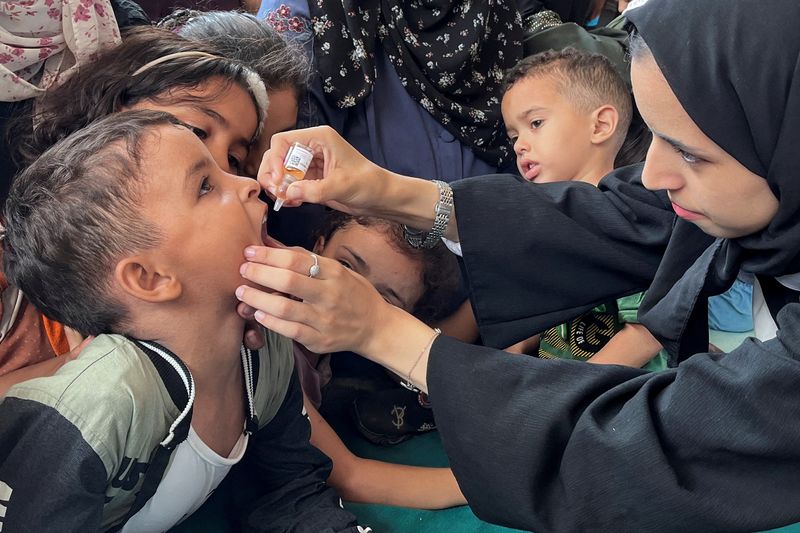By Nidal al-Mughrabi and Hussam al-Masri
CAIRO/GAZA (Reuters) -The United Nations, in collaboration with Palestinian health authorities, began to vaccinate 640,000 children in the Gaza Strip on Sunday, with Israel and Hamas agreeing to brief pauses in their 11-month-old war to allow the campaign to go ahead.
The World Health Organisation (WHO) confirmed last month that a baby was partially paralysed by the type 2 polio virus, the first such case in the territory in 25 years.
The campaign began on Sunday in areas of central Gaza, and will move to other areas in coming days. Fighting will pause for at least eight hours on three consecutive days.
The WHO said the pauses will likely need to extend to a fourth day and the first round of vaccinations will take just under two weeks.
At the end of the first day, the territory's health ministry said at least 72,611 children had taken the vaccine.
Children, escorted by members of their families, crowded a UN-run clinic in the central Gaza city of Deir Al-Balah, where around one million people were sheltering, according to Palestinian officials. Medical staffers marked children who got the drops with a pen on their fingers.
"I came to the UNRWA clinic today to vaccinate my daughters against polio and God willing we won't see any more diseases other than the diseases we are already experiencing. I hope we will go back to our homes safe and sound," said Gaza mother Afnan Al-Muqayyad.
Polio was just one of many of Al-Muqayyad's concerns.
"Skin diseases are widespread, there are no detergents, detergents are very expensive and we can’t afford them. Also, the food is very expensive, everything is expensive, and the children's weight is dropping, they were fine before but now they're becoming very thin. I hope God will set things straight," she said.
'COMPLEX' CAMPAIGN
Juliette Touma, communications director of UNRWA, the U.N. Palestinian refugee agency, said the vaccination campaign was massive and "one of the most complex in the world."
"Today is test time for parties to the conflict to respect these area pauses to allow the UNRWA teams and other medical workers to reach children with these very precious two drops. It's a race against time," Touma told Reuters.
Israel and Hamas, who have so far failed to conclude a deal that would end the war, said they would cooperate to allow the campaign to succeed.
WHO officials say at least 90% of the children need to be vaccinated twice with four weeks between doses for the campaign to succeed, but it faces huge challenges in Gaza, which has been largely destroyed by the war.
"Children continue to be exposed, it knows no borders, checkpoints or lines of fighting. Every child must be vaccinated in Gaza and Israel to curb the risks of this vicious disease spreading," said Touma.
Meanwhile, Israeli forces continued to battle Hamas-led militants in several areas across the Palestinian enclave. Residents said Israeli army troops blew up several houses in Rafah, near the border with Egypt, while tanks continued to operate in the northern Gaza City suburb of Zeitoun.
On Sunday, Israel recovered the bodies of six hostages from a tunnel in southern Gaza, saying they were killed not long before Israeli troops reached them.

The war was triggered after Hamas militants on Oct. 7 stormed into southern Israel killing 1,200 people and taking more than 250 hostages by Israeli tallies.
Since then, at least 40,691 Palestinians have been killed and 94,060 injured in Gaza, the enclave's health ministry says.
(Reporting and writing by Nidal al-Mughrabi. Additional reporting by Hussam al-Masri and Ramadan Abed in Gaza; Editing by Sharon Singleton and Philippa Fletcher)